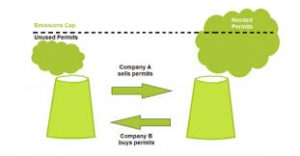Emissions Trading Scheme (ETS):

The Surat Emissions Trading Scheme (ETS) is the world’s first market-based mechanism specifically designed to control particulate air pollution.
- An Emissions Trading Scheme (ETS) is a regulatory tool that aims to reduce air pollution by introducing economic incentives.
- Under ETS, a cap is imposed on the total permissible emissions.
Industries receive emission permits, which can be bought and sold, allowing companies to trade pollution rights. - This system is also referred to as “cap-and-trade”.
- Cleaner industries can sell their unused permits to polluting units, creating an economic incentive for pollution reduction.
- The Surat Emissions Trading Scheme (ETS) launched in 2019 is the world’s first ETS focused on trading particulate pollution (not CO₂), and India’s first emissions market for any pollutant.
- It targeted 342 high-emitting industries, mainly in the textile sector, which used solid fuels like coal and lignite, and liquid fuels like diesel.
- The scheme was developed by the Gujarat Pollution Control Board (GPCB) in collaboration with J-PAL, EPIC, and Yale University.




